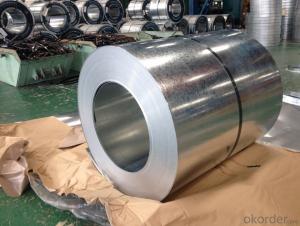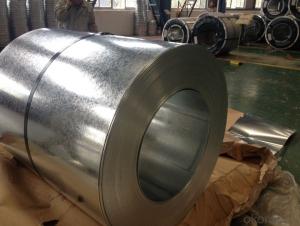Hot-Dipped Galvanized Steel Coil in Coil
- Loading Port:
- Shanghai
- Payment Terms:
- TT OR LC
- Min Order Qty:
- 25 m.t
- Supply Capability:
- 5000 m.t/month
OKorder Service Pledge
OKorder Financial Service
You Might Also Like
Hot-Dipped Galvanized Steel Coil in Coil
Description:
Galvanized Steel Coil gets coated in layers of zinc because rust won't attack this protective metal. The most external layer is all zinc, but successive layers are a mixture of zinc and iron, with an interior of pure steel. These multiple layers are responsible for the amazing property of the metal to withstand corrosion-inducing circumstances. Zinc also protects the steel by acting as a "sacrificial layer." If rust does take hold on the surface of Galvanized Steel Coil, the zinc will get corroded first. This allows the zinc that is spread over the breach or scratch to prevent rust from reaching the steel. For countless outdoor, marine, or industrial applications, Galvanized Steel Coil is an essential fabrication component.
Application:
With excellent cold bending molded manufacturability, good decoration effect, strong anti-corrosion ability, galvanized steel coils and sheets are also pollution-free and easily recycled. Accordingly, they can be used as final products and basic plates of color coated steel coils and widely applied in construction, home appliances, decoration
Construction field ,ships building industry ,Petroleum and chemical industries ,war and electricity industries ,food processing and medical industry, boiler heat exchanger, machinery and hardware fields
Electrical Appliance:refrigetator.washer,switch cabinet,etc
Furniture:central heating slice, lampshade, etc
Product Specification:
Material:SGCC,DX51D,Q195
Thickness: 0.3-3.0mm
Width: 600-1500mm
Inner Diameter: 508mm, 610mm
Weight of Steel Coil: 3-15MT
Coating Type: Al-Zn Alloy
Available Dipped Layer: 50-150g/m2
Surface Finish Structure: Normal Spangle & Small Spangle & Zero Spangle
Steel grade & Standard: JIS G3302 SGCC
Spangle: Normal spangle, large spangle, small(min) spangle, zero spangle
FAQ:
1.How about the package for the Hot Dip Galvanized Steel in Coil?
Package:Covered with waterproof-paper, strapped by strips. Standard seaworthy export package:4 eye bands and 4 circumferential bands in steel, galvanized metal fluted rings on inner and outer edges, galvanized metal & waterproof paper wall protection disk, galvanized metal & waterproof paper around circumference and bore protection.
2. Can I know the production period of the goods?
Usually it need 20 days for 25tons in one container. We can produce 300 tons per day but we need to arrange the production in advance.
3. How about the label, could you make the label according to pour requirements?
Usually we use the MILL label, but if you need special form we can make.
- Q:How much does a steel coil weigh?
- The weight of a steel coil can vary depending on its dimensions and thickness. However, on average, a steel coil can weigh anywhere between 2 to 20 tons.
- Q:How are steel coils used in the HVAC industry?
- Steel coils are commonly used in the HVAC industry for various purposes such as heat transfer, refrigerant circulation, and air conditioning. They are typically found in heat exchangers, condensers, and evaporators, where they help in transferring heat between air and refrigerant. Steel coils play a crucial role in maintaining the desired temperature and providing efficient cooling or heating in HVAC systems.
- Q:How are steel coils used in the agricultural sector?
- Steel coils are widely used in the agricultural sector for various purposes. One of the main uses is in the construction of farm machinery and equipment. Steel coils are often used in the manufacturing of tractors, plows, harvesters, and other heavy-duty machinery. The strength and durability of steel make it an ideal material for these applications, as it can withstand the demanding conditions of agricultural work. Additionally, steel coils are used in the construction of agricultural buildings and structures. Steel is known for its high structural integrity, making it a popular choice for barns, storage units, and other agricultural facilities. Steel coils are often used to create the framework and support systems of these structures, providing stability and long-lasting durability. Moreover, steel coils are used in the production of irrigation systems. The pipes and tubes used for transporting water in agricultural irrigation systems are often made from steel coils. Steel's resistance to corrosion and its ability to handle high-pressure flows make it an excellent choice for this application. In summary, steel coils play a crucial role in the agricultural sector. From the construction of farm machinery and buildings to irrigation systems, steel's strength and durability make it a preferred material in the industry.
- Q:Can steel coils be coated with chemical-resistant materials?
- Yes, steel coils can be coated with chemical-resistant materials. The use of chemical-resistant coatings helps protect the steel coils from corrosion and damage caused by exposure to various chemicals, acids, or solvents. These coatings create a barrier that prevents the chemicals from reaching the steel surface and ensure the durability and longevity of the coils in harsh chemical environments.
- Q:How are steel coils used in the production of industrial valves?
- Steel coils are used in the production of industrial valves as they are typically cut and formed into various components, such as valve bodies and stems. The coils provide a strong and durable material for the valves, ensuring their reliability and longevity in industrial applications.
- Q:How do steel coils contribute to the circular economy?
- Steel coils contribute to the circular economy through their recyclability and reusability. The circular economy aims to minimize waste and promote the continuous use of resources, and steel coils align perfectly with this concept. Firstly, steel coils are made from recycled steel, which reduces the need for extracting raw materials and the associated environmental impact. By using recycled steel, we can conserve natural resources and reduce energy consumption during the manufacturing process. This practice helps to lower carbon emissions and decrease the overall ecological footprint. Furthermore, steel coils can be easily recycled at the end of their lifecycle. Steel is one of the most recycled materials globally, with a high recycling rate. When the coils reach the end of their use, they can be collected, processed, and transformed into new steel products, without losing their properties or quality. This closed-loop recycling system ensures that steel resources are continuously utilized, minimizing the need for virgin steel production. Additionally, steel coils support the circular economy by enabling the creation of durable and long-lasting products. Steel is known for its strength and durability, making it ideal for various applications such as construction, automotive, and packaging. By using steel coils, we can produce products that have a longer lifespan, reducing the need for frequent replacements and minimizing waste generation. Moreover, steel coils can be reused multiple times before they are recycled. They can be rewound, reshaped, or repurposed for different applications, extending their lifecycle and reducing the demand for new coils. This reuse aspect of steel coils contributes to resource efficiency and waste reduction. In summary, steel coils play a significant role in the circular economy by being made from recycled steel, being easily recyclable themselves, enabling the creation of durable products, and promoting reuse. Their contribution helps to close the loop in the steel industry, conserves natural resources, reduces waste generation, and minimizes environmental impact.
- Q:What are the environmental considerations associated with steel coil production?
- The environmental considerations associated with steel coil production include the extraction of raw materials, such as iron ore and coal, which can lead to habitat destruction and air/water pollution. The manufacturing process involves energy-intensive operations and emissions of greenhouse gases, contributing to climate change. Waste generated during production, such as slag and dust, can also have negative impacts on the environment if not properly managed. Additionally, the transportation of steel coils over long distances can result in carbon emissions and increase the overall environmental footprint of the product.
- Q:What are the dimensions of steel coils used in the structural component industry?
- The dimensions of steel coils used in the structural component industry can vary depending on the specific application and requirements. However, some common dimensions for steel coils used in this industry include a width ranging from 600mm to 2000mm and a thickness ranging from 0.25mm to 10mm. The weight of these coils can also vary, typically ranging from a few kilograms to several tonnes. Additionally, the length of the steel coils can be customized to meet the specific needs of the structural component industry, with common lengths being 2000mm, 2500mm, and 3000mm. It is important to note that these dimensions are not exhaustive and can vary based on the specific product and manufacturer.
- Q:What is the maximum diameter of a steel coil?
- The maximum diameter of a steel coil can vary depending on multiple factors such as the type of steel, coil weight, and the specific dimensions required by the manufacturer. However, in general, steel coils can range in maximum diameter from a few feet to several meters.
- Q:What are the common quality issues with steel coils?
- Some common quality issues with steel coils include: 1. Surface defects: Steel coils may have surface defects such as scratches, pits, or rust spots. These defects can affect the appearance and smoothness of the final product and may also impact its performance. 2. Dimensional variations: Steel coils may exhibit dimensional variations, such as thickness variations, width variations, or length variations. These variations can lead to difficulties in processing the steel and may result in inconsistent product dimensions. 3. Mechanical properties: Steel coils may have variations in mechanical properties such as yield strength, tensile strength, or hardness. These variations can affect the strength and durability of the final product and may also impact its suitability for specific applications. 4. Coating issues: Steel coils that are coated or galvanized may experience issues with the coating, such as uneven coverage, peeling, or adhesion problems. These coating issues can result in reduced corrosion resistance and compromised aesthetics. 5. Internal defects: Steel coils may have internal defects such as inclusions, voids, or segregations. These defects can weaken the steel and may lead to failure or breakage during processing or use. 6. Edge issues: Steel coils may have edge defects, such as burrs, cracks, or uneven edges. These edge issues can affect the handling and processing of the steel and may also lead to problems during fabrication or assembly. 7. Coil set or camber: Steel coils may exhibit coil set or camber, which refers to the curvature or bowing of the coil. This can result in difficulties during processing and may lead to distorted or misaligned products. To ensure the quality of steel coils, manufacturers employ various quality control measures such as rigorous inspection, testing, and adherence to industry standards and specifications.
1. Manufacturer Overview |
|
|---|---|
| Location | |
| Year Established | |
| Annual Output Value | |
| Main Markets | |
| Company Certifications | |
2. Manufacturer Certificates |
|
|---|---|
| a) Certification Name | |
| Range | |
| Reference | |
| Validity Period | |
3. Manufacturer Capability |
|
|---|---|
| a)Trade Capacity | |
| Nearest Port | |
| Export Percentage | |
| No.of Employees in Trade Department | |
| Language Spoken: | |
| b)Factory Information | |
| Factory Size: | |
| No. of Production Lines | |
| Contract Manufacturing | |
| Product Price Range | |
Send your message to us
Hot-Dipped Galvanized Steel Coil in Coil
- Loading Port:
- Shanghai
- Payment Terms:
- TT OR LC
- Min Order Qty:
- 25 m.t
- Supply Capability:
- 5000 m.t/month
OKorder Service Pledge
OKorder Financial Service
Similar products
New products
Hot products
Related keywords





























